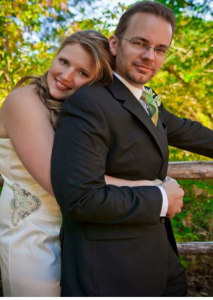 I grew up in a small dusty town outside of Lubbock, Texas. Growing up out there, my dad and several other family members were on the Lubbock Fire Department and that must be where my interest in emergency response grew up. Most of my memories from growing up out there revolved around the incredible thunderstorms and tornadoes we frequently had. As a firefighter, my dad would often have to go out to give field reports as my mom and I huddled indoors. In fact, my earliest memory is of the time I was playing outside with our next door neighbor, and suddenly running inside to tell my mother that the “sky didn’t look right” only to have our house directly hit by a tornado seconds later.
I grew up in a small dusty town outside of Lubbock, Texas. Growing up out there, my dad and several other family members were on the Lubbock Fire Department and that must be where my interest in emergency response grew up. Most of my memories from growing up out there revolved around the incredible thunderstorms and tornadoes we frequently had. As a firefighter, my dad would often have to go out to give field reports as my mom and I huddled indoors. In fact, my earliest memory is of the time I was playing outside with our next door neighbor, and suddenly running inside to tell my mother that the “sky didn’t look right” only to have our house directly hit by a tornado seconds later.
A couple years later, my dad bought me an electronic experiment set, which included instructions for building your own AM receiver. To be able to put together a few parts and be able to pick up radio signals blew my mind, and I spent my teenage years trying to pick up radio signals from greater and greater distances.
Fast forward to 1997, when I started college in Dallas, Texas. My best friend and I decided we wanted to start chasing and photographing storms, particularly lightning and tornadoes. After risking our lives doing that for a couple of years, I learned about the NWS Skywarn program. I couldn’t sign up fast enough, so in 2000, I studied for two weeks and got my ham radio license and joined the South Plains Storm Spotting team. This team was unique in that we covered 19 counties in West Texas, and along with working directly with the National Weather Service, we also worked with the Severe Storm Research teams at Texas Tech, Oklahoma State University, and several local TV stations.
About a year later, after the Sept 11 terrorist attacks, a couple members of the city council came to our ham radio club and asked us to put together the first ARES group in West Texas, which I was honored to assist in doing.
Eventually, I moved up to Oregon and due to the lack of exciting storms, my activity level in ham radio drastically diminished, until last year when my schedule finally provided me the time to dedicate to the Multnomah ARES unit. I am excited and honored to be working with a team of people that are so well organized, dynamic, and awesome in order to provide the county & state with what I consider one of the top ARES teams in the US!
Outside of ham radio, I am currently trying to finish a communications degree at PSU and am in the process of restarting my photography business. I also do security consulting, risk and threat assessments, and a little executive protection. I love camping, shooting, and am excited to announce that my wife and I are expecting our first child this fall.
 I grew up in a small dusty town outside of Lubbock, Texas. Growing up out there, my dad and several other family members were on the Lubbock Fire Department and that must be where my interest in emergency response grew up. Most of my memories from growing up out there revolved around the incredible thunderstorms and tornadoes we frequently had. As a firefighter, my dad would often have to go out to give field reports as my mom and I huddled indoors. In fact, my earliest memory is of the time I was playing outside with our next door neighbor, and suddenly running inside to tell my mother that the “sky didn’t look right” only to have our house directly hit by a tornado seconds later.
I grew up in a small dusty town outside of Lubbock, Texas. Growing up out there, my dad and several other family members were on the Lubbock Fire Department and that must be where my interest in emergency response grew up. Most of my memories from growing up out there revolved around the incredible thunderstorms and tornadoes we frequently had. As a firefighter, my dad would often have to go out to give field reports as my mom and I huddled indoors. In fact, my earliest memory is of the time I was playing outside with our next door neighbor, and suddenly running inside to tell my mother that the “sky didn’t look right” only to have our house directly hit by a tornado seconds later.